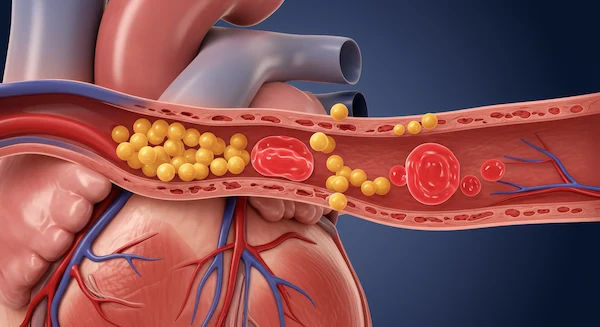Homocysteine Test Overview and Insights
Learn about the homocysteine test, its purpose, procedure, and insights into heart health, vitamin deficiencies, and risk assessment for certain medical conditions.

Written by Dr. Dhankecha Mayank Dineshbhai
Reviewed by Dr. Md Yusuf Shareef MBBS
Last updated on 1st Sep, 2025

If you’ve heard about a homocysteine test and are wondering what it is, why it matters, or whether you might need one, this guide is for you. We’ll break down everything in simple terms, what homocysteine is, why its levels matter, and how you can manage them for better health.
What is a Homocysteine Test?
A homocysteine test measures the amount of homocysteine, an amino acid in your blood. While homocysteine is naturally produced in the body, high levels can be harmful and are linked to several health conditions, including heart disease, stroke, and vitamin deficiencies.
This test helps doctors assess your risk for these conditions and determine if you need dietary changes, supplements, or further medical evaluation.
Consult a Top Specialist
Why is the Homocysteine Test Done?
Your doctor may recommend this test if:
- You have symptoms of vitamin B12, B6, or folate deficiency (like fatigue, dizziness, or pale skin).
- You have a family history of heart disease or stroke at a young age.
- You’ve had unexplained blood clots or cardiovascular issues.
- You’re being evaluated for homocystinuria (a rare genetic disorder affecting homocysteine metabolism).
Understanding High Homocysteine Levels
Normally, homocysteine levels should be:
- Optimal: Below 10 µmol/L
- Moderate risk: 10–12 µmol/L
- High risk: Above 12 µmol/L
High homocysteine (hyperhomocysteinemia) can damage blood vessels, increasing the risk of:
- Heart disease & stroke (due to artery damage)
- Blood clots (leading to deep vein thrombosis)
- Cognitive decline & dementia (linked to brain health)
- Pregnancy complications (like preeclampsia)
What Causes High Homocysteine?
Several factors can raise homocysteine levels:
- Vitamin deficiencies (B12, B6, folate) – These vitamins help break down homocysteine.
- Poor diet – Low intake of leafy greens, beans, and fortified grains.
- Kidney disease – Impaired kidney function affects homocysteine removal.
- Genetics – Some people metabolize homocysteine poorly.
- Smoking & excessive alcohol – These interfere with vitamin absorption.
- Certain medications (like methotrexate or anti-seizure drugs).
How to Lower Homocysteine Naturally
The good news? You can manage high homocysteine with simple lifestyle changes!
1. Eat a Nutrient-Rich Diet
- Folate (Vitamin B9): Found in leafy greens (spinach, kale), lentils, and citrus fruits.
- Vitamin B12: Found in eggs, dairy, fish, and fortified cereals (or supplements if deficient).
- Vitamin B6: Found in bananas, chickpeas, poultry, and potatoes.
2. Consider Supplements (If Needed)
If diet alone isn’t enough, your doctor may recommend:
- Folic acid supplements
- Vitamin B12 injections or tablets
- Vitamin B6 supplements
3. Quit Smoking & Limit Alcohol
- Both can deplete B vitamins, worsening homocysteine levels.
4. Exercise Regularly
- Physical activity improves circulation and metabolism, helping regulate homocysteine.
5. Manage Chronic Conditions
- If you have diabetes, high blood pressure, or kidney disease, proper treatment can help control homocysteine.
When Should You Get Tested?
Consider a homocysteine test if:
- You have unexplained fatigue, memory issues, or nerve problems.
- You have a family history of heart disease or stroke.
- You’re pregnant and at risk for complications.
- You follow a strict vegan diet (since B12 is mainly in animal products).
How is the Test Done?
- A simple blood test, usually after fasting for 8–12 hours.
- Results are typically available within a few days.
Get Your Health Assessed
Need a Homocysteine Test?
If you’d like to check your homocysteine levels, you can book a test or consult a doctor easily through Apollo 24|7. Early detection and simple adjustments can make a big difference in your long-term health!
Final Thoughts
High homocysteine is a silent risk factor, but it’s manageable with the right diet, supplements, and lifestyle changes. If you suspect your levels might be high, talk to your doctor about getting tested, especially if you have risk factors for heart disease or vitamin deficiencies.
Consult a Top Specialist
Consult a Top Specialist

Dr. Chaithra H
General Physician/ Internal Medicine Specialist
6 Years • MBBS, MD General Medicine, DNB General Medicine
Bangalore
Apollo 24|7 Clinic - Karnataka, Bangalore

Dr. Suraja Nutulapati
General Physician/ Internal Medicine Specialist
10 Years • MBBS, MD (Internal Medicine)
Hyderabad
Apollo 24|7 Clinic, Hyderabad
(975+ Patients)

Dr. Mohammed Kamran
General Practitioner
5 Years • MBBS, FIDM
Nashik
Apollo 24|7 Clinic - Maharashtra, Nashik

Dr. Siri Nallapu
General Practitioner
5 Years • MBBS
Hyderabad
Apollo 24|7 Clinic, Hyderabad

Dr. Rohinipriyanka Reddy
General Practitioner
9 Years • MBBS
Hyderabad
Apollo 24|7 Clinic, Hyderabad
Consult a Top Specialist

Dr. Chaithra H
General Physician/ Internal Medicine Specialist
6 Years • MBBS, MD General Medicine, DNB General Medicine
Bangalore
Apollo 24|7 Clinic - Karnataka, Bangalore

Dr. Suraja Nutulapati
General Physician/ Internal Medicine Specialist
10 Years • MBBS, MD (Internal Medicine)
Hyderabad
Apollo 24|7 Clinic, Hyderabad
(975+ Patients)

Dr. Mohammed Kamran
General Practitioner
5 Years • MBBS, FIDM
Nashik
Apollo 24|7 Clinic - Maharashtra, Nashik

Dr. Siri Nallapu
General Practitioner
5 Years • MBBS
Hyderabad
Apollo 24|7 Clinic, Hyderabad

Dr. Rohinipriyanka Reddy
General Practitioner
9 Years • MBBS
Hyderabad
Apollo 24|7 Clinic, Hyderabad

